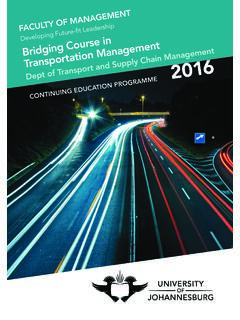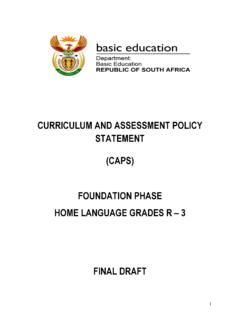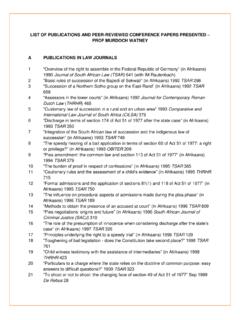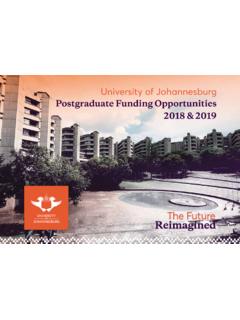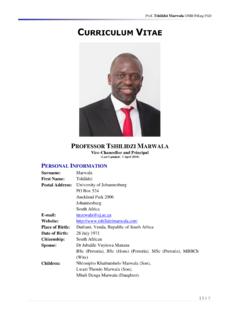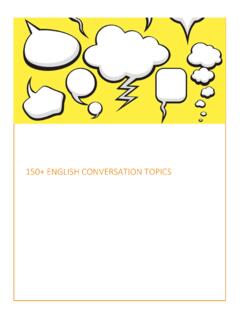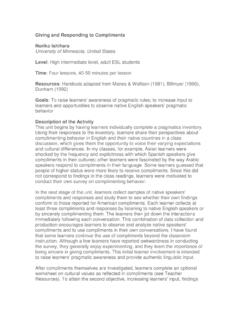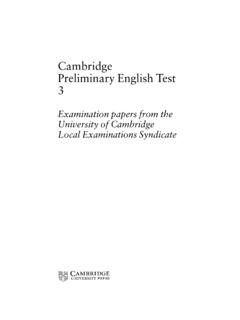Transcription of INFORMATION BOOKLET - University of Johannesburg
1 INFORMATION BOOKLET : Post Graduate Certificate in Education 2022(Contact Programme) INFORMATION BOOKLET : POST GRADUATE CERTIFICATE IN EDUCATION 2021 (CONTACT PROGRAMME)The Faculty of Education at UJ is committed to knowledge making for 21st century education. To this end, the Faculty offers two Postgraduate Certificate in Education (PGCE) programmes as of 2021. Both focus on secondary school teaching - one on the Further Education and Training Teaching phase and the other on Senior Phase Teaching. School-based Work Integrated Learning (WIL), including supervised and assessed teaching practice, is an important part of the Postgraduate Certificate in Education programme. Students are expected to spend up to ten weeks of WIL in schools in which one period consists of seven consecutive weeks.
2 Through integrating coursework at the University and practicum at schools the Faculty creates learning opportunities for student-teachers to acquire: A thorough understanding of learning and development in adolescence Sound subject knowledge with an understanding of contextual factors that impactlearning and schooling An appreciation of the demands of the teaching profession and a repertoire ofteaching strategies and skills A reflective stance towards Postgraduate Certificate in Education is a professional teaching programme that `caps an undergraduate degree or an approved diploma. It offers entry-level initial professional preparation for qualifying undergraduate degree or diploma holders who wish to develop focused knowledge and skills as classroom teachers in a chosen phase(s) and/or subject(s).
3 The qualification requires a specific depth and specialisation of knowledge, together with practical skills and workplace experience, to enable successful students to apply their learning as beginner teachers in schools in varying OUTCOMESS tudents who complete this programme will be able to: T each at least two school subjects in chosen phase(s) as per their qualification. Support and nurture learning and development in diverse educational contexts. Identify and address barriers to learning in the classroom. F ormulate a personal teaching philosophy and critically reflect on how it relates toa teacher s professional achieve the outcomes the programme integrates the knowledge mix of disciplinary, pedagogical, practical, and situational learning through the following in the programme: E ducation and Teaching Studies (mainly disciplinary, pedagogical and situationallearning): Includes a focus on the adolescent as learner, the teaching profession,education policies, communication, teaching as the practice of citizenship,classroom management and INFORMATION and communication technologies for theteaching profession.
4 Teaching methodology and practicum (mainly pedagogical and practical learning with elements of situational learning): Teaching methodology and practicum are integrated. This implies that students will engage in learning from practice, learning in practice and learning from service, aiming at developing specialised pedagogical content knowledge and teaching competence in the chosen subject. Even though the knowledge areas as indicated above are specified, the curriculum is organised to enable coherence and cohesiveness and an integration of theory and OF THE PROGRAMME AND OFFERING1 Year (full time) or 2 years (part time): The coursework will be offered in contact mode making use of a blended learning approach necessitating engagement with the curriculum and completion of some activities in an online environment.
5 The practical experience (WIL) will be conducted at faculty partner REQUIREMENTSTo gain access to the Postgraduate Certificate in Further Education and Training Phase Teaching (FET) an applicant must have sufficient disciplinary knowledge in appropriate academic fields to enable the development of teaching specialisation phases and/or subjects as specified for each school phase. This is outlined as follows: A first degree on an NQF Level 7 with a minimum of 360 credits, and Two school related subjects, both at 3rd year gain access to the Post Graduate Certificate in Senior Phase and Further Education and Training Teaching (SP and FET) applicant must have sufficient disciplinary knowledge in appropriate academic fields to enable the development of teaching specialisation phases and/or subjects as specified for each school phase.
6 This is outlined as follows: A first degree on NQF level 7 with a minimum of 360 credits, and Two school related subjects, one on 3rd year level and one on 1st year level OR An approved National Diploma on level 6 with a minimum of 360 credits from an accredited higher institution, and Two school related subjects, one on 2nd year level and one on 3rd year level. The National N Diploma cannot be considered for admission to the requirements for subject specialisations are listed in the relevant tables that COMPETENCYAll qualifying PGCE students should be proficient in the use of at least one official South African language as a language of learning and teaching (LoLT), and partially proficient ( sufficient for purposes of basic conversation) in at least one other official African language, or in South African Sign Language, as a language of conversational competence (LoCC).
7 If the LoLT is english or Afrikaans, then the LoCC must be an African Language or South African Sign Language. All new certificates are to be endorsed to indicate the holder s level of competence in specific languages by using appropriate labels, for example: LoLT ( english ) and LoCC (isiZulu). A UJ short learning programme (SLP) in isiZulu will be on offer at an additional cost to those that do not meet the language competency requirements. This SLP must be successfully completed for a PGCE student to graduate. The following demonstrable competencies in LoCC will be accepted:An African home language Grade 12 school subject Successful completion of the UJ short learning programme in IsiZulu or an equivalent certification from another COMPETENCYAll PGCE graduates must be digitally fluent requiring a high level of ICT competency.
8 Where necessary, students that were identified lacking sufficient ICT skills will be required to complete an online short learning programme (SLP) in Basic computer skills. This SLP must be successfully completed for a PGCE student to graduate. DISCLAIMER Fulfilling all the minimum entry requirements does not guarantee acceptance into a particular programme. The faculty reserves the right to limit numbers in line with its enrolment targets. The Faculty of Education also reserves the right to cancel an application or registration in the event that there are insufficient student enrolments to ensure the viability of the electives in the PGCE programme. Students will be advised if they fall into the latter category and offered an alternative if they meet the minimum entry requirements.
9 A typical qualification will have the following components:Table 1: Programme componentsFULL TIME (ONE YEAR)PART TIME (TWO YEARS)Education and Teaching Studies (ETS)YEAR 1 Education and Teaching Studies (ETS) (No WIL in Year 1)Introduction to Teaching (ITT)YEAR 2 Introduction to Teaching (ITT)Methodology and Practicum FETM ethodology and Practicum FETM ethodology and Practicum FET/SPMethodology and Practicum FET/SPExcursion (Compulsory)Excursion (Compulsory)WIL (10 weeks: Three weeks in Semester 1 and seven consecutive weeks in Semester 2)WIL (10 weeks: Three weeks in Semester 1 and seven consecutive weeks in Semester 2)Additional training required for LoCC and ICT if competencies are not in placeLanguage of conversational competency (LoCC) - Short learning programme (SLP) in isiZuluYEAR 1 / YEAR 2 Language of conversational competency (LoCC) - Short learning programme (SLP) in isiZuluICT competency - Online short learning programme (SLP) in Basic computer skillsICT competency - Online short learning programme (SLP) in Basic computer skillsPOST GRADUATE CERTIFICATE IN SENIOR PHASE AND FURTHER EDUCATION AND TRAINING TEACHINGT here are six areas of specialisation in this PGCE (SP and FET) qualification.
10 Successful applicants can only be registered in ONE of the packages for which they meet the entry codeArea of specialisationA5 SBUQC ommerce EducationA5 SLAQL anguagesA5 SMAQM athematicsA5 NSSQS ciencesA5 STEQT echnologyA5 SARQArts and CultureSP and FET Specialisation packages with minimum requirements for the Methodology and Practicum modules: A5 SBUQ; A5 SLAQ; A5 SMAQ; A5 NSSQ; A5 STEQ; A5 SARQArea of specialisation: ARTS AND CULTUREQ ualification code: A5 SARQADMISSION REQUIREMENTS1. METHODOLOGY AND PRACTICUM (SP)Arts and Culture Fine Arts on 2nd year University level or one of the Design Arts on 2nd year University METHODOLOGY AND PRACTICUM (FET)Design Arts One of the following fields on 3rd year University level:Digital design / Fashion and costume design /Graphic design /Industrial design / INFORMATION design, INFORMATION design / Interior design / Jewellery design / Textile design / Theatre set designVisual ArtsFine Arts on 3rd year University levelSee Table 1 for programme components (ETS; ITT; LoCC competency.)


